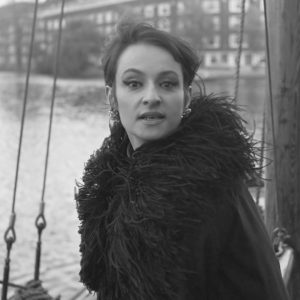European Diary, 24.11.2020: Twenty-three years ago today, Barbara Brodi died. Born in 1930 as Monique Andrée Serf, she was known, of course, primarily under the name with which she conquered the chanson stages of the world: Barbara.

Barbara in Amsterdam, 19. October 1965
Her father Jacques Serf came from Alsace, her mother Esther Brodsky from Odessa. In 1940 she fled with her Jewish family out of the German-occupied part of France. She was finally able to go into hiding in a small rural community in southeastern France, and in 1944 she experienced liberation in hiding, now near Paris. A music teacher from the neighborhood heard her singing, and soon she received singing and piano lessons. She had her first musical appearances in a Parisian cabaret and soon moved to Brussels where she sang chansons by Edith Piaf and Juliette Greco. Back in Paris she also performed songs of her new friends Jacques Brel and Georges Brassens.
At the beginning of July 1964, even before her big breakthrough one year later, Barbara came to a guest performance at the “Young Theatre Göttingen”. She had only hesitantly accepted, and finally, perhaps to put the seriousness of this first invitation from Germany to the test a little, insisted on playing on a grand piano. When she entered the stage on July 4, 1964, however, there was only a little piano – and she refused to perform. The grand piano was finally borrowed by an old lady in Göttingen and carried through the city by ten students. The concert began two hours late. And Barbara stayed for a week. On the last day she wrote a song that was to become a melodious symbol of French-German peace and friendship, sung by a Jewish singer: “Göttingen”. In 1967, when she was to perform again in Göttingen and this time in the sold-out Stadthalle, the municipal concert hall, the concert was broadcast live in France.
And here the text in French and English.
Barbara
Göttingen
Bien sûr ce n’est pas la Seine
Ce n’est pas le bois de Vincennes
Mais c’est bien joli quand même
À Göttingen, à Göttingen
Pas de quais et pas de rengaines
Qui se lamentent et qui se traînent
Mais l’amour y fleurit quand même
À Göttingen, à Göttingen
Ils savent mieux que nous je pense
L’histoire de nos rois de France
Herman, Peter, Helga et Hans
À Göttingen
Et que personne ne s’offense
Mais les contes de notre enfance
Il était une fois commence
À Göttingen
Bien sûr nous, nous avons la Seine
Et puis notre bois de Vincennes
Mais Dieu que les roses sont belles
À Göttingen, à Göttingen
Nous, nous avons nos matins blêmes
Et l’âme grise de Verlaine
Eux c’est la mélancolie même
À Göttingen, à Göttingen
Quand ils ne savent rien nous dire
Ils restent…
Göttingen
Certainly, there is no Seine
And also the forest not of Vincennes,
But there would be a lot to say
From Göttingen, from Göttingen
Paris is sung about again and again,
There are no songs about Göttingen,
And love blooms there as well
In Göttingen, in Göttingen.
It seems to me, we are far worse connoisseurs
In terms of “France’s great men
When Hermann, Helga, Fritz and Franz
In Göttingen.
Here also played without question,
The fairy tale of our childhood days:
“Once upon a time…” Yes, where did it begin?
In Göttingen.
Certainly, there are no Seine
And also the forest not of Vincennes,
But I never saw such beautiful roses
In Göttingen, in Göttingen
The dawn is not the same
Like Verlaine, the silver-pale one,
But sadly it is also true for the French
In Göttingen, in Göttingen
It does not get further with words,
Then know that smiling is smarter:
It can achieve even more with us,
The blond child in Göttingen…
What I say now, that certainly sounds
For some people unforgivable:
The children are exactly the same
In Paris, as in Göttingen.
Let this time never return
And never again hatred will destroy the world:
There are people I love,
In Göttingen, in Göttingen
But weapons should speak again,
It would break my heart!
Who knows what would be left over
From Göttingen, from Göttingen.
Beautiful roses bloom
In Göttingen, in Göttingen.
But weapons should speak again,
It would give me
break the heart!
Who knows what would remain
From Göttingen, from Göttingen.
